Business Law Case Study: Analyzing Misleading Advertising and ACCC
VerifiedAdded on 2023/06/12
|9
|2141
|239
Case Study
AI Summary
This case study examines a scenario where a company named Ohau is accused of engaging in misleading and deceptive conduct through its advertising campaign for a product called 'Less is Best'. The analysis identifies key issues related to false claims about the product's weight loss benefits and the absence of clinical proof to support these claims. It applies relevant sections of the Australian Consumer Law (ACL), particularly section 18 concerning misleading and deceptive conduct and section 29(1) regarding false representations in the supply of goods and services. By referencing landmark cases such as Parkdale Custom Built Furniture Pty Ltd v Puxu Pty Ltd and Google Inc v Australian Competition and Consumer Commission, the study evaluates whether Ohau's conduct would likely deceive a reasonable member of the target audience. The study concludes that the ACCC has grounds to initiate proceedings against Ohau and that the court can order corrective advertising, issue injunctions, and award damages to parties who suffered losses due to the misleading conduct. Desklib provides access to similar solved assignments and past papers for students.
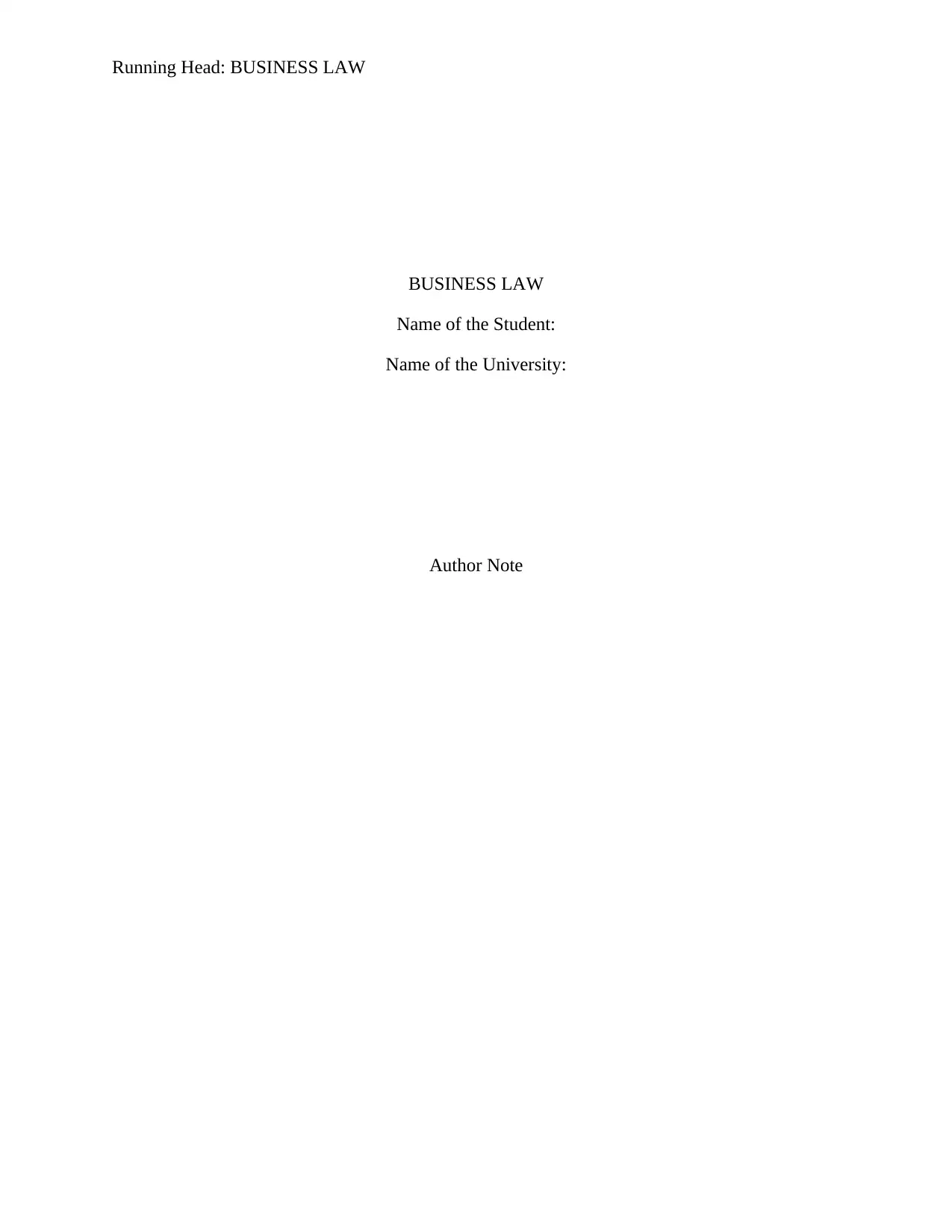
Running Head: BUSINESS LAW
BUSINESS LAW
Name of the Student:
Name of the University:
Author Note
BUSINESS LAW
Name of the Student:
Name of the University:
Author Note
Paraphrase This Document
Need a fresh take? Get an instant paraphrase of this document with our AI Paraphraser
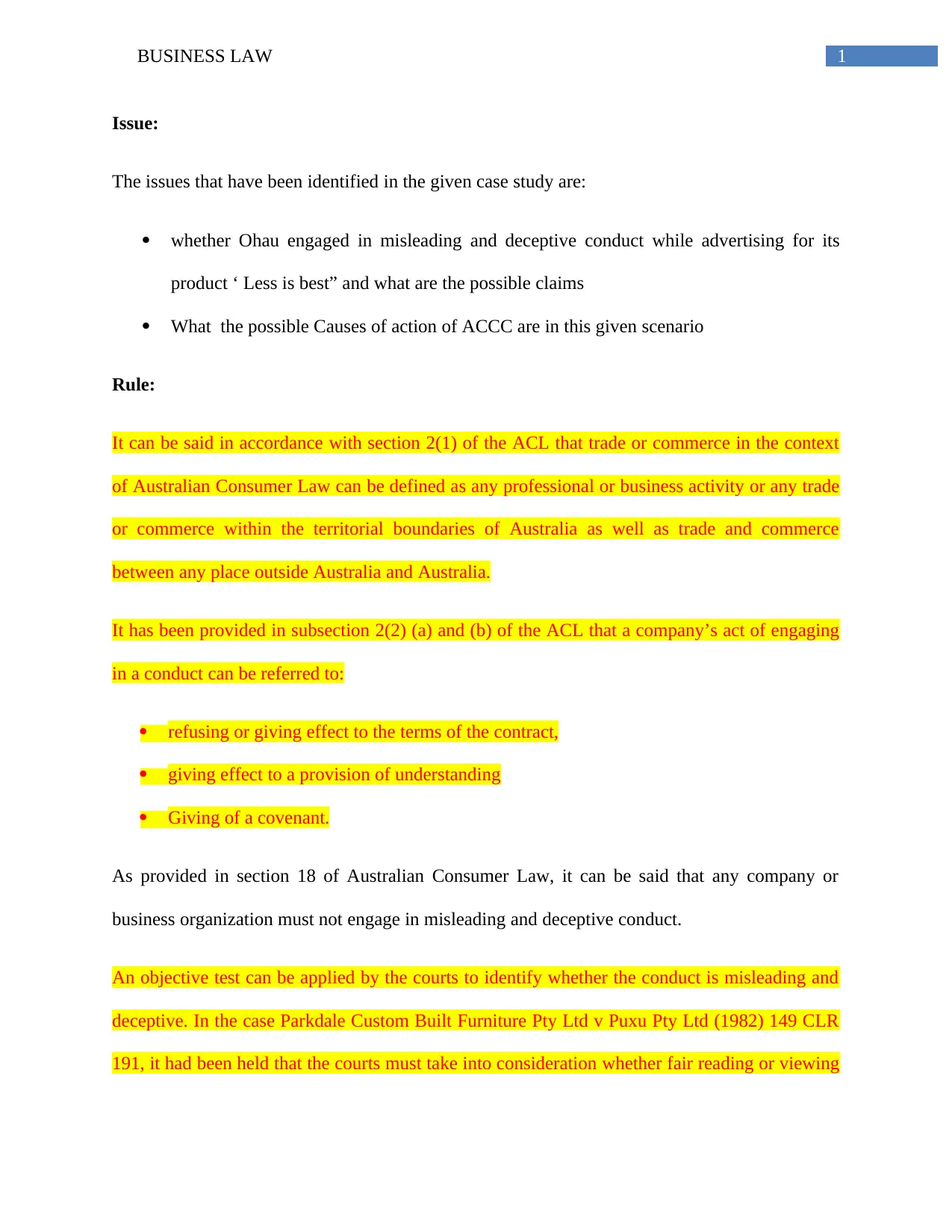
1BUSINESS LAW
Issue:
The issues that have been identified in the given case study are:
whether Ohau engaged in misleading and deceptive conduct while advertising for its
product ‘ Less is best” and what are the possible claims
What the possible Causes of action of ACCC are in this given scenario
Rule:
It can be said in accordance with section 2(1) of the ACL that trade or commerce in the context
of Australian Consumer Law can be defined as any professional or business activity or any trade
or commerce within the territorial boundaries of Australia as well as trade and commerce
between any place outside Australia and Australia.
It has been provided in subsection 2(2) (a) and (b) of the ACL that a company’s act of engaging
in a conduct can be referred to:
refusing or giving effect to the terms of the contract,
giving effect to a provision of understanding
Giving of a covenant.
As provided in section 18 of Australian Consumer Law, it can be said that any company or
business organization must not engage in misleading and deceptive conduct.
An objective test can be applied by the courts to identify whether the conduct is misleading and
deceptive. In the case Parkdale Custom Built Furniture Pty Ltd v Puxu Pty Ltd (1982) 149 CLR
191, it had been held that the courts must take into consideration whether fair reading or viewing
Issue:
The issues that have been identified in the given case study are:
whether Ohau engaged in misleading and deceptive conduct while advertising for its
product ‘ Less is best” and what are the possible claims
What the possible Causes of action of ACCC are in this given scenario
Rule:
It can be said in accordance with section 2(1) of the ACL that trade or commerce in the context
of Australian Consumer Law can be defined as any professional or business activity or any trade
or commerce within the territorial boundaries of Australia as well as trade and commerce
between any place outside Australia and Australia.
It has been provided in subsection 2(2) (a) and (b) of the ACL that a company’s act of engaging
in a conduct can be referred to:
refusing or giving effect to the terms of the contract,
giving effect to a provision of understanding
Giving of a covenant.
As provided in section 18 of Australian Consumer Law, it can be said that any company or
business organization must not engage in misleading and deceptive conduct.
An objective test can be applied by the courts to identify whether the conduct is misleading and
deceptive. In the case Parkdale Custom Built Furniture Pty Ltd v Puxu Pty Ltd (1982) 149 CLR
191, it had been held that the courts must take into consideration whether fair reading or viewing
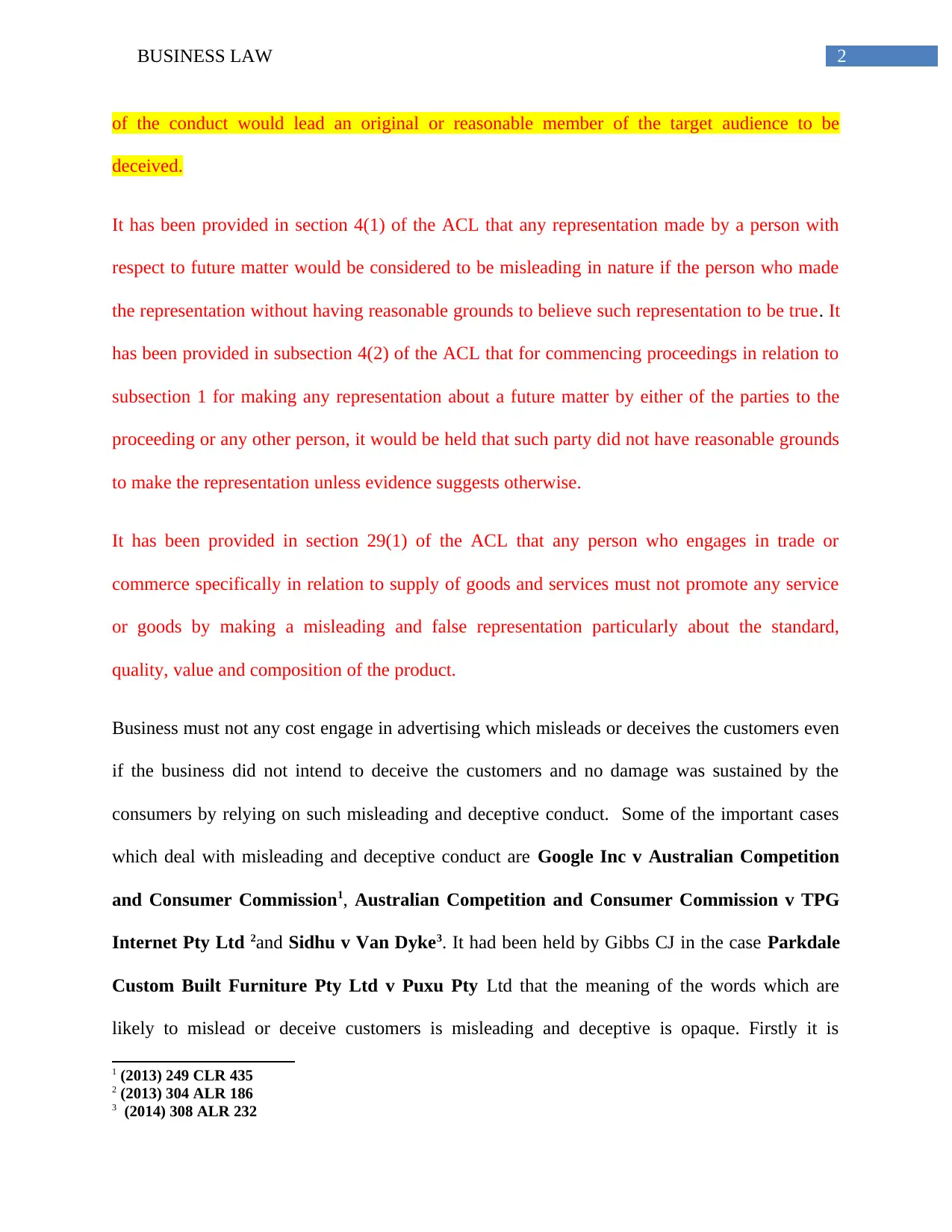
2BUSINESS LAW
of the conduct would lead an original or reasonable member of the target audience to be
deceived.
It has been provided in section 4(1) of the ACL that any representation made by a person with
respect to future matter would be considered to be misleading in nature if the person who made
the representation without having reasonable grounds to believe such representation to be true. It
has been provided in subsection 4(2) of the ACL that for commencing proceedings in relation to
subsection 1 for making any representation about a future matter by either of the parties to the
proceeding or any other person, it would be held that such party did not have reasonable grounds
to make the representation unless evidence suggests otherwise.
It has been provided in section 29(1) of the ACL that any person who engages in trade or
commerce specifically in relation to supply of goods and services must not promote any service
or goods by making a misleading and false representation particularly about the standard,
quality, value and composition of the product.
Business must not any cost engage in advertising which misleads or deceives the customers even
if the business did not intend to deceive the customers and no damage was sustained by the
consumers by relying on such misleading and deceptive conduct. Some of the important cases
which deal with misleading and deceptive conduct are Google Inc v Australian Competition
and Consumer Commission1, Australian Competition and Consumer Commission v TPG
Internet Pty Ltd 2and Sidhu v Van Dyke3. It had been held by Gibbs CJ in the case Parkdale
Custom Built Furniture Pty Ltd v Puxu Pty Ltd that the meaning of the words which are
likely to mislead or deceive customers is misleading and deceptive is opaque. Firstly it is
1 (2013) 249 CLR 435
2 (2013) 304 ALR 186
3 (2014) 308 ALR 232
of the conduct would lead an original or reasonable member of the target audience to be
deceived.
It has been provided in section 4(1) of the ACL that any representation made by a person with
respect to future matter would be considered to be misleading in nature if the person who made
the representation without having reasonable grounds to believe such representation to be true. It
has been provided in subsection 4(2) of the ACL that for commencing proceedings in relation to
subsection 1 for making any representation about a future matter by either of the parties to the
proceeding or any other person, it would be held that such party did not have reasonable grounds
to make the representation unless evidence suggests otherwise.
It has been provided in section 29(1) of the ACL that any person who engages in trade or
commerce specifically in relation to supply of goods and services must not promote any service
or goods by making a misleading and false representation particularly about the standard,
quality, value and composition of the product.
Business must not any cost engage in advertising which misleads or deceives the customers even
if the business did not intend to deceive the customers and no damage was sustained by the
consumers by relying on such misleading and deceptive conduct. Some of the important cases
which deal with misleading and deceptive conduct are Google Inc v Australian Competition
and Consumer Commission1, Australian Competition and Consumer Commission v TPG
Internet Pty Ltd 2and Sidhu v Van Dyke3. It had been held by Gibbs CJ in the case Parkdale
Custom Built Furniture Pty Ltd v Puxu Pty Ltd that the meaning of the words which are
likely to mislead or deceive customers is misleading and deceptive is opaque. Firstly it is
1 (2013) 249 CLR 435
2 (2013) 304 ALR 186
3 (2014) 308 ALR 232
⊘ This is a preview!⊘
Do you want full access?
Subscribe today to unlock all pages.

Trusted by 1+ million students worldwide
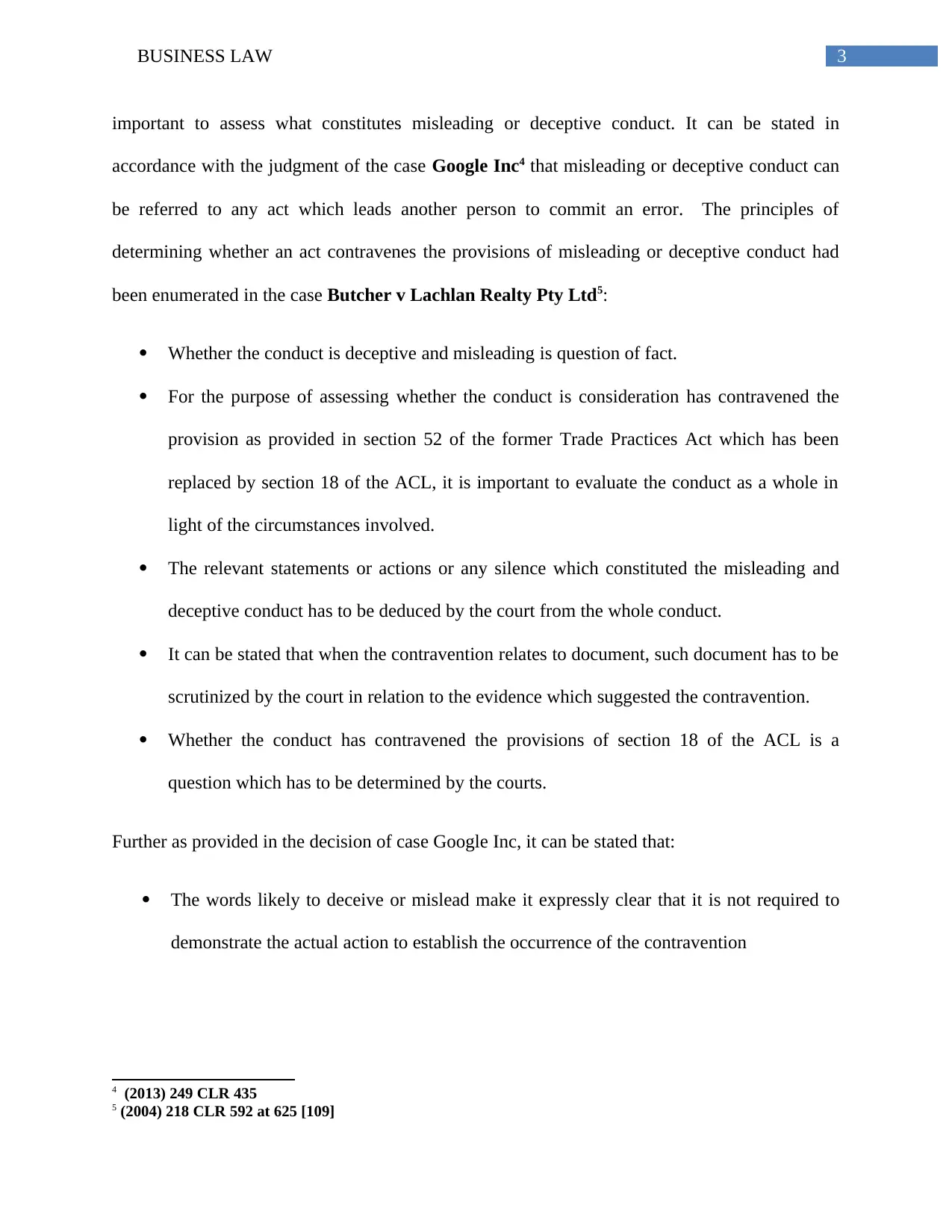
3BUSINESS LAW
important to assess what constitutes misleading or deceptive conduct. It can be stated in
accordance with the judgment of the case Google Inc4 that misleading or deceptive conduct can
be referred to any act which leads another person to commit an error. The principles of
determining whether an act contravenes the provisions of misleading or deceptive conduct had
been enumerated in the case Butcher v Lachlan Realty Pty Ltd5:
Whether the conduct is deceptive and misleading is question of fact.
For the purpose of assessing whether the conduct is consideration has contravened the
provision as provided in section 52 of the former Trade Practices Act which has been
replaced by section 18 of the ACL, it is important to evaluate the conduct as a whole in
light of the circumstances involved.
The relevant statements or actions or any silence which constituted the misleading and
deceptive conduct has to be deduced by the court from the whole conduct.
It can be stated that when the contravention relates to document, such document has to be
scrutinized by the court in relation to the evidence which suggested the contravention.
Whether the conduct has contravened the provisions of section 18 of the ACL is a
question which has to be determined by the courts.
Further as provided in the decision of case Google Inc, it can be stated that:
The words likely to deceive or mislead make it expressly clear that it is not required to
demonstrate the actual action to establish the occurrence of the contravention
4 (2013) 249 CLR 435
5 (2004) 218 CLR 592 at 625 [109]
important to assess what constitutes misleading or deceptive conduct. It can be stated in
accordance with the judgment of the case Google Inc4 that misleading or deceptive conduct can
be referred to any act which leads another person to commit an error. The principles of
determining whether an act contravenes the provisions of misleading or deceptive conduct had
been enumerated in the case Butcher v Lachlan Realty Pty Ltd5:
Whether the conduct is deceptive and misleading is question of fact.
For the purpose of assessing whether the conduct is consideration has contravened the
provision as provided in section 52 of the former Trade Practices Act which has been
replaced by section 18 of the ACL, it is important to evaluate the conduct as a whole in
light of the circumstances involved.
The relevant statements or actions or any silence which constituted the misleading and
deceptive conduct has to be deduced by the court from the whole conduct.
It can be stated that when the contravention relates to document, such document has to be
scrutinized by the court in relation to the evidence which suggested the contravention.
Whether the conduct has contravened the provisions of section 18 of the ACL is a
question which has to be determined by the courts.
Further as provided in the decision of case Google Inc, it can be stated that:
The words likely to deceive or mislead make it expressly clear that it is not required to
demonstrate the actual action to establish the occurrence of the contravention
4 (2013) 249 CLR 435
5 (2004) 218 CLR 592 at 625 [109]
Paraphrase This Document
Need a fresh take? Get an instant paraphrase of this document with our AI Paraphraser
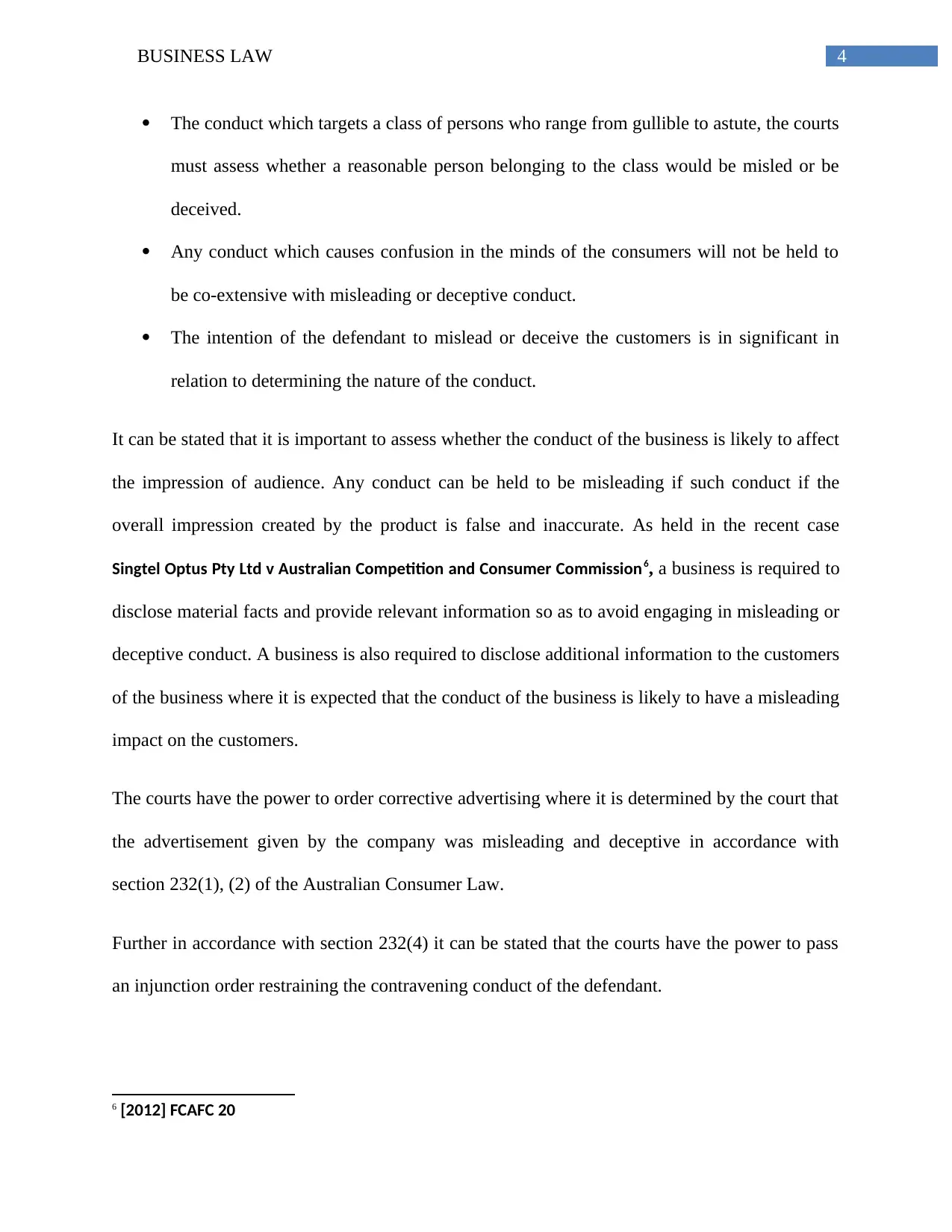
4BUSINESS LAW
The conduct which targets a class of persons who range from gullible to astute, the courts
must assess whether a reasonable person belonging to the class would be misled or be
deceived.
Any conduct which causes confusion in the minds of the consumers will not be held to
be co-extensive with misleading or deceptive conduct.
The intention of the defendant to mislead or deceive the customers is in significant in
relation to determining the nature of the conduct.
It can be stated that it is important to assess whether the conduct of the business is likely to affect
the impression of audience. Any conduct can be held to be misleading if such conduct if the
overall impression created by the product is false and inaccurate. As held in the recent case
Singtel Optus Pty Ltd v Australian Competition and Consumer Commission6, a business is required to
disclose material facts and provide relevant information so as to avoid engaging in misleading or
deceptive conduct. A business is also required to disclose additional information to the customers
of the business where it is expected that the conduct of the business is likely to have a misleading
impact on the customers.
The courts have the power to order corrective advertising where it is determined by the court that
the advertisement given by the company was misleading and deceptive in accordance with
section 232(1), (2) of the Australian Consumer Law.
Further in accordance with section 232(4) it can be stated that the courts have the power to pass
an injunction order restraining the contravening conduct of the defendant.
6 [2012] FCAFC 20
The conduct which targets a class of persons who range from gullible to astute, the courts
must assess whether a reasonable person belonging to the class would be misled or be
deceived.
Any conduct which causes confusion in the minds of the consumers will not be held to
be co-extensive with misleading or deceptive conduct.
The intention of the defendant to mislead or deceive the customers is in significant in
relation to determining the nature of the conduct.
It can be stated that it is important to assess whether the conduct of the business is likely to affect
the impression of audience. Any conduct can be held to be misleading if such conduct if the
overall impression created by the product is false and inaccurate. As held in the recent case
Singtel Optus Pty Ltd v Australian Competition and Consumer Commission6, a business is required to
disclose material facts and provide relevant information so as to avoid engaging in misleading or
deceptive conduct. A business is also required to disclose additional information to the customers
of the business where it is expected that the conduct of the business is likely to have a misleading
impact on the customers.
The courts have the power to order corrective advertising where it is determined by the court that
the advertisement given by the company was misleading and deceptive in accordance with
section 232(1), (2) of the Australian Consumer Law.
Further in accordance with section 232(4) it can be stated that the courts have the power to pass
an injunction order restraining the contravening conduct of the defendant.
6 [2012] FCAFC 20
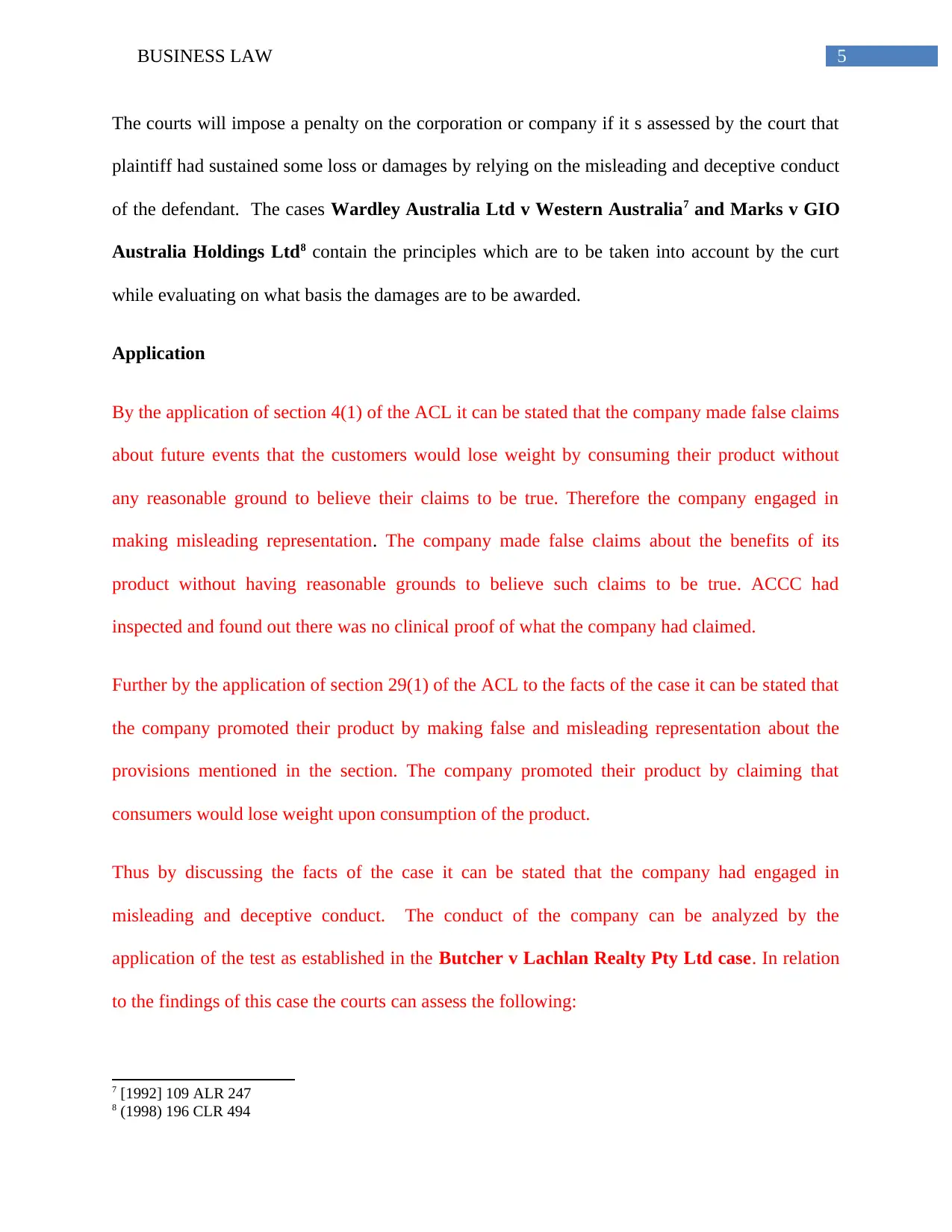
5BUSINESS LAW
The courts will impose a penalty on the corporation or company if it s assessed by the court that
plaintiff had sustained some loss or damages by relying on the misleading and deceptive conduct
of the defendant. The cases Wardley Australia Ltd v Western Australia7 and Marks v GIO
Australia Holdings Ltd8 contain the principles which are to be taken into account by the curt
while evaluating on what basis the damages are to be awarded.
Application
By the application of section 4(1) of the ACL it can be stated that the company made false claims
about future events that the customers would lose weight by consuming their product without
any reasonable ground to believe their claims to be true. Therefore the company engaged in
making misleading representation. The company made false claims about the benefits of its
product without having reasonable grounds to believe such claims to be true. ACCC had
inspected and found out there was no clinical proof of what the company had claimed.
Further by the application of section 29(1) of the ACL to the facts of the case it can be stated that
the company promoted their product by making false and misleading representation about the
provisions mentioned in the section. The company promoted their product by claiming that
consumers would lose weight upon consumption of the product.
Thus by discussing the facts of the case it can be stated that the company had engaged in
misleading and deceptive conduct. The conduct of the company can be analyzed by the
application of the test as established in the Butcher v Lachlan Realty Pty Ltd case. In relation
to the findings of this case the courts can assess the following:
7 [1992] 109 ALR 247
8 (1998) 196 CLR 494
The courts will impose a penalty on the corporation or company if it s assessed by the court that
plaintiff had sustained some loss or damages by relying on the misleading and deceptive conduct
of the defendant. The cases Wardley Australia Ltd v Western Australia7 and Marks v GIO
Australia Holdings Ltd8 contain the principles which are to be taken into account by the curt
while evaluating on what basis the damages are to be awarded.
Application
By the application of section 4(1) of the ACL it can be stated that the company made false claims
about future events that the customers would lose weight by consuming their product without
any reasonable ground to believe their claims to be true. Therefore the company engaged in
making misleading representation. The company made false claims about the benefits of its
product without having reasonable grounds to believe such claims to be true. ACCC had
inspected and found out there was no clinical proof of what the company had claimed.
Further by the application of section 29(1) of the ACL to the facts of the case it can be stated that
the company promoted their product by making false and misleading representation about the
provisions mentioned in the section. The company promoted their product by claiming that
consumers would lose weight upon consumption of the product.
Thus by discussing the facts of the case it can be stated that the company had engaged in
misleading and deceptive conduct. The conduct of the company can be analyzed by the
application of the test as established in the Butcher v Lachlan Realty Pty Ltd case. In relation
to the findings of this case the courts can assess the following:
7 [1992] 109 ALR 247
8 (1998) 196 CLR 494
⊘ This is a preview!⊘
Do you want full access?
Subscribe today to unlock all pages.

Trusted by 1+ million students worldwide
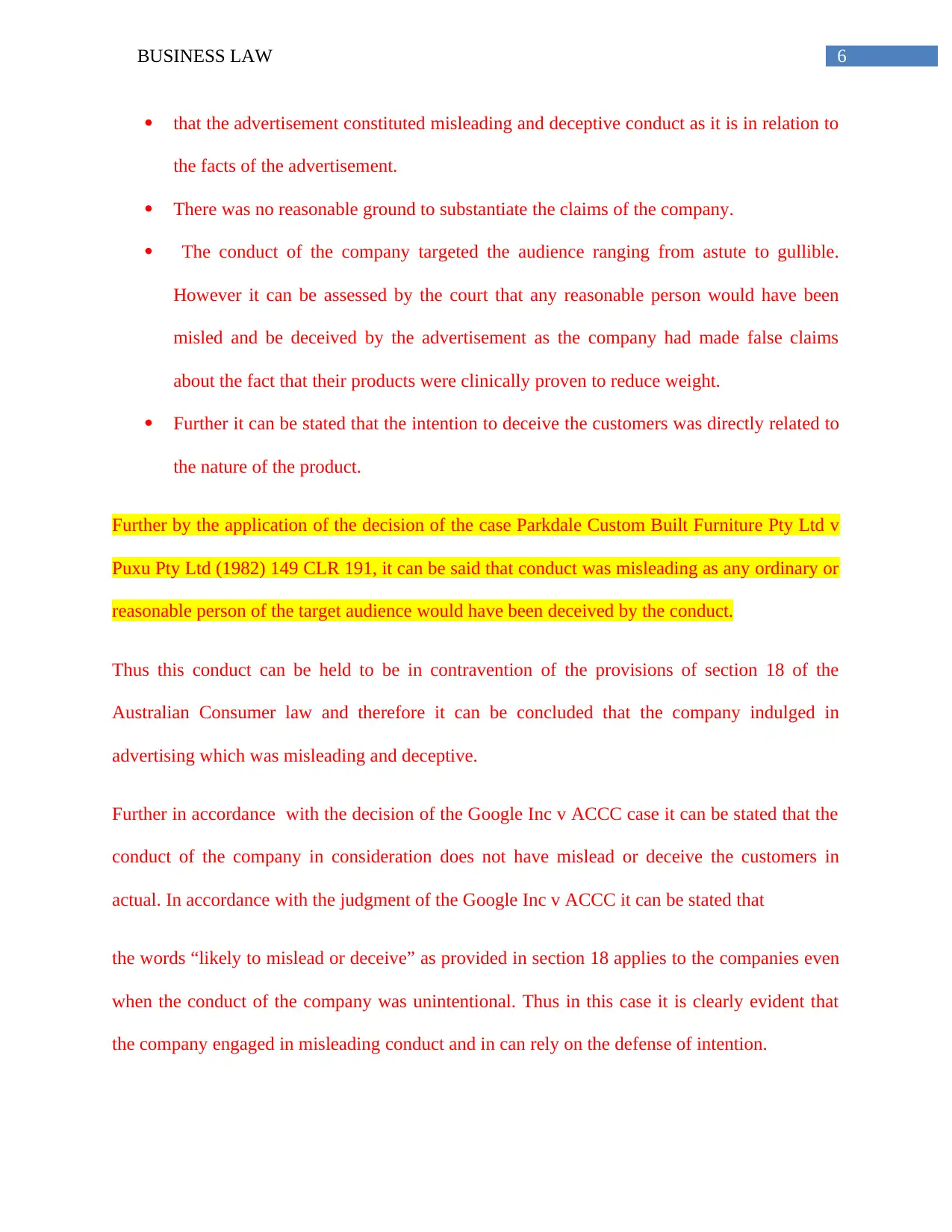
6BUSINESS LAW
that the advertisement constituted misleading and deceptive conduct as it is in relation to
the facts of the advertisement.
There was no reasonable ground to substantiate the claims of the company.
The conduct of the company targeted the audience ranging from astute to gullible.
However it can be assessed by the court that any reasonable person would have been
misled and be deceived by the advertisement as the company had made false claims
about the fact that their products were clinically proven to reduce weight.
Further it can be stated that the intention to deceive the customers was directly related to
the nature of the product.
Further by the application of the decision of the case Parkdale Custom Built Furniture Pty Ltd v
Puxu Pty Ltd (1982) 149 CLR 191, it can be said that conduct was misleading as any ordinary or
reasonable person of the target audience would have been deceived by the conduct.
Thus this conduct can be held to be in contravention of the provisions of section 18 of the
Australian Consumer law and therefore it can be concluded that the company indulged in
advertising which was misleading and deceptive.
Further in accordance with the decision of the Google Inc v ACCC case it can be stated that the
conduct of the company in consideration does not have mislead or deceive the customers in
actual. In accordance with the judgment of the Google Inc v ACCC it can be stated that
the words “likely to mislead or deceive” as provided in section 18 applies to the companies even
when the conduct of the company was unintentional. Thus in this case it is clearly evident that
the company engaged in misleading conduct and in can rely on the defense of intention.
that the advertisement constituted misleading and deceptive conduct as it is in relation to
the facts of the advertisement.
There was no reasonable ground to substantiate the claims of the company.
The conduct of the company targeted the audience ranging from astute to gullible.
However it can be assessed by the court that any reasonable person would have been
misled and be deceived by the advertisement as the company had made false claims
about the fact that their products were clinically proven to reduce weight.
Further it can be stated that the intention to deceive the customers was directly related to
the nature of the product.
Further by the application of the decision of the case Parkdale Custom Built Furniture Pty Ltd v
Puxu Pty Ltd (1982) 149 CLR 191, it can be said that conduct was misleading as any ordinary or
reasonable person of the target audience would have been deceived by the conduct.
Thus this conduct can be held to be in contravention of the provisions of section 18 of the
Australian Consumer law and therefore it can be concluded that the company indulged in
advertising which was misleading and deceptive.
Further in accordance with the decision of the Google Inc v ACCC case it can be stated that the
conduct of the company in consideration does not have mislead or deceive the customers in
actual. In accordance with the judgment of the Google Inc v ACCC it can be stated that
the words “likely to mislead or deceive” as provided in section 18 applies to the companies even
when the conduct of the company was unintentional. Thus in this case it is clearly evident that
the company engaged in misleading conduct and in can rely on the defense of intention.
Paraphrase This Document
Need a fresh take? Get an instant paraphrase of this document with our AI Paraphraser
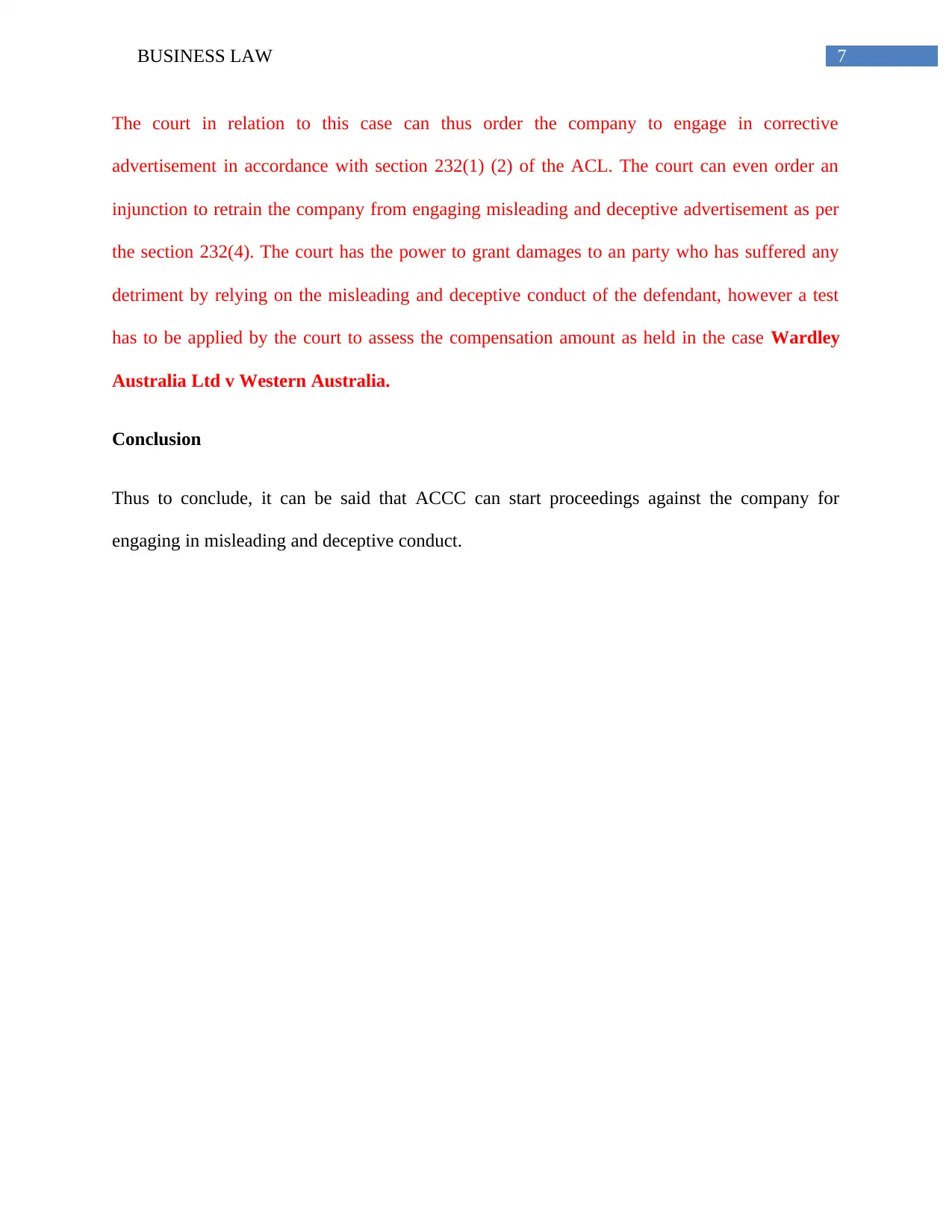
7BUSINESS LAW
The court in relation to this case can thus order the company to engage in corrective
advertisement in accordance with section 232(1) (2) of the ACL. The court can even order an
injunction to retrain the company from engaging misleading and deceptive advertisement as per
the section 232(4). The court has the power to grant damages to an party who has suffered any
detriment by relying on the misleading and deceptive conduct of the defendant, however a test
has to be applied by the court to assess the compensation amount as held in the case Wardley
Australia Ltd v Western Australia.
Conclusion
Thus to conclude, it can be said that ACCC can start proceedings against the company for
engaging in misleading and deceptive conduct.
The court in relation to this case can thus order the company to engage in corrective
advertisement in accordance with section 232(1) (2) of the ACL. The court can even order an
injunction to retrain the company from engaging misleading and deceptive advertisement as per
the section 232(4). The court has the power to grant damages to an party who has suffered any
detriment by relying on the misleading and deceptive conduct of the defendant, however a test
has to be applied by the court to assess the compensation amount as held in the case Wardley
Australia Ltd v Western Australia.
Conclusion
Thus to conclude, it can be said that ACCC can start proceedings against the company for
engaging in misleading and deceptive conduct.
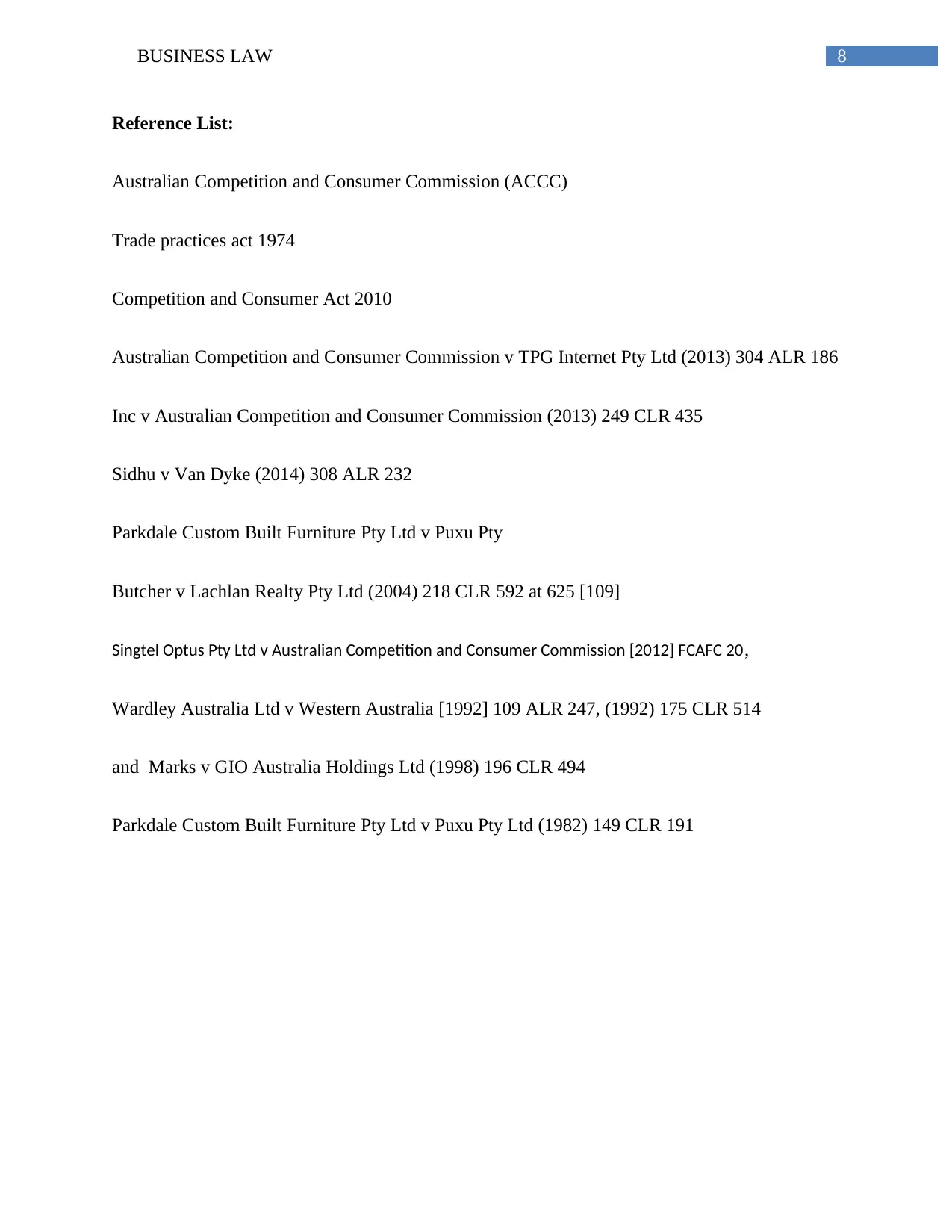
8BUSINESS LAW
Reference List:
Australian Competition and Consumer Commission (ACCC)
Trade practices act 1974
Competition and Consumer Act 2010
Australian Competition and Consumer Commission v TPG Internet Pty Ltd (2013) 304 ALR 186
Inc v Australian Competition and Consumer Commission (2013) 249 CLR 435
Sidhu v Van Dyke (2014) 308 ALR 232
Parkdale Custom Built Furniture Pty Ltd v Puxu Pty
Butcher v Lachlan Realty Pty Ltd (2004) 218 CLR 592 at 625 [109]
Singtel Optus Pty Ltd v Australian Competition and Consumer Commission [2012] FCAFC 20,
Wardley Australia Ltd v Western Australia [1992] 109 ALR 247, (1992) 175 CLR 514
and Marks v GIO Australia Holdings Ltd (1998) 196 CLR 494
Parkdale Custom Built Furniture Pty Ltd v Puxu Pty Ltd (1982) 149 CLR 191
Reference List:
Australian Competition and Consumer Commission (ACCC)
Trade practices act 1974
Competition and Consumer Act 2010
Australian Competition and Consumer Commission v TPG Internet Pty Ltd (2013) 304 ALR 186
Inc v Australian Competition and Consumer Commission (2013) 249 CLR 435
Sidhu v Van Dyke (2014) 308 ALR 232
Parkdale Custom Built Furniture Pty Ltd v Puxu Pty
Butcher v Lachlan Realty Pty Ltd (2004) 218 CLR 592 at 625 [109]
Singtel Optus Pty Ltd v Australian Competition and Consumer Commission [2012] FCAFC 20,
Wardley Australia Ltd v Western Australia [1992] 109 ALR 247, (1992) 175 CLR 514
and Marks v GIO Australia Holdings Ltd (1998) 196 CLR 494
Parkdale Custom Built Furniture Pty Ltd v Puxu Pty Ltd (1982) 149 CLR 191
⊘ This is a preview!⊘
Do you want full access?
Subscribe today to unlock all pages.

Trusted by 1+ million students worldwide
1 out of 9
Related Documents
Your All-in-One AI-Powered Toolkit for Academic Success.
+13062052269
info@desklib.com
Available 24*7 on WhatsApp / Email
![[object Object]](/_next/static/media/star-bottom.7253800d.svg)
Unlock your academic potential
Copyright © 2020–2026 A2Z Services. All Rights Reserved. Developed and managed by ZUCOL.





